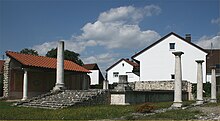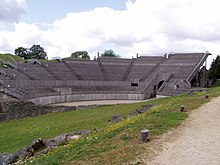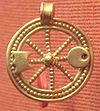Grannus: Difference between revisions
Magioladitis (talk | contribs) m Moved punctuation mark to correct place + other fixes, References after punctuation per WP:CITEFOOT and WP:PAIC |
Importing Wikidata short description: "Water deity" |
||
| Line 1: | Line 1: | ||
{{Short description|Water deity}} |
|||
[[File:Lauingen Apollo-Grannus-Tempel.jpg|right|thumb|A partially reconstructed temple of Apollo Grannus at Faimingen (''Phoebiana'') near [[Lauingen]]]] |
[[File:Lauingen Apollo-Grannus-Tempel.jpg|right|thumb|A partially reconstructed temple of Apollo Grannus at Faimingen (''Phoebiana'') near [[Lauingen]]]] |
||
'''Grannus''' (also ''Granus'', ''[[Mogons|Mogounus]],''<ref name="mogo"/> and ''Amarcolitanus''<ref name="amarco"/>) was a Celtic deity of [[classical antiquity]]. He was regularly identified with [[Apollo]] as '''Apollo Grannus''' and frequently worshipped in conjunction with [[Sirona (goddess)|Sirona]], and sometimes with [[Mars (mythology)|Mars]] and other deities.<ref name="SMF"/> |
'''Grannus''' (also ''Granus'', ''[[Mogons|Mogounus]],''<ref name="mogo"/> and ''Amarcolitanus''<ref name="amarco"/>) was a Celtic deity of [[classical antiquity]]. He was regularly identified with [[Apollo]] as '''Apollo Grannus''' and frequently worshipped in conjunction with [[Sirona (goddess)|Sirona]], and sometimes with [[Mars (mythology)|Mars]] and other deities.<ref name="SMF"/> |
||
Latest revision as of 22:32, 28 November 2024

Grannus (also Granus, Mogounus,[1] and Amarcolitanus[2]) was a Celtic deity of classical antiquity. He was regularly identified with Apollo as Apollo Grannus and frequently worshipped in conjunction with Sirona, and sometimes with Mars and other deities.[3]
Name
[edit]Etymology
[edit]The theonym Grannus is a latinized form of Gaulish Grannos.[4] The same stem appears in the personal names Grania, Grannia, Grannicus, and Grannica, as well as in the place names Grignols (from an earlier *Granno-ialon 'Grannus' clearing'), Aquae Granni (> Aachen), and Granéjouls.[5]
Its etymology remains debated. The name could be connected to Proto-Celtic *grand-/grend-, meaning 'beard' (cf. Middle Irish grend, Middle Welsh grann 'chin, beard, cheek', Middle Breton grann 'eyebrow'), although some scholars have pointed that the god is never actually portrayed with a beard. Old French grenon ('small beard'), Old Spanish greñon ('beard') and Occitan gren ('moustache') are derived from an earlier *grennos, that is supposed to be Gaulish, but the vocalism is difficult to reconcile with the other forms.[5][6][7]
An alternative etymology connects the name to a reconstructed form *gra-snó- (< *gwhr-snó-), which could be related to Proto-Celtic *gwrīns-/gwrens-, meaning 'heat' (cf. Middle Irish grīs 'heat, glow, embers', Middle Welsh gwres 'heat [of the sun, fire], passion, lust').[4][8] Scholar Jürgen Zeidler contends that this would be a "probable reference to the sun's heat and its healing properties".[9] In early twentieth century scholarship, the theonym was often compared with the Old Irish grían ('sun'),[5] which, according to linguist Ranko Matasović, should be derived from Proto-Celtic *gwrensā (> Primitive Irish *gwrēnā).[8]
Epithets
[edit]At Monthelon, Grannus is called Deus Apollo Grannus Amarcolitanus[2] ("The one with a piercing or far-reaching look"[10]), and at Horbourg-Wihr Apollo Grannus Mogounus.[3][1]
In all of his centres of worship where he is assimilated to a Roman god, Grannus was identified with Apollo,[3] presumably in Apollo's role as a healing or solar deity. In Trier, he is identified more specifically with Phoebus as Apollo Grannus Phoebus.[11][3]
Centres of worship
[edit]

One of the god's most famous cult centres was at Aquae Granni (now Aachen, Germany). Aachen means ‘water’ in Old High German, a calque of the Roman name of "Aquae Granni".[12] The town's hot springs with temperatures between 45 °C and 75 °C lay in the somewhat inhospitably marshy area around Aachen's basin-shaped valley region.[12] Aachen first became a curative centre in Hallstatt times.[12]
According to Cassius Dio, the Roman Emperor Caracalla (188 AD to 217 AD) unsuccessfully sought help from Apollo Grannus—as well as Aesculapius and Serapis—during a bout of physical and mental illness, visiting the god's shrine and making many votive offerings; Dio claims that the gods refused to heal him because they knew Caracalla's intentions to be evil.[13] Caracalla's visit to the shrine of ‘the Celtic healing-god’ Grannus was during the war with Germany in 213.[14][citation needed]
Festival
[edit]A 1st century AD Latin inscription from a public fountain in Limoges mentions a Gaulish ten-night festival of Grannus (lightly Latinized as decamnoctiacis Granni):
- POSTVMVS DV[M]
- NORIGIS F(ilius) VERG(obretus) AQV
- AM MARTIAM DECAM
- NOCTIACIS GRANNI D(e) S(ua) P(ecunia) D(edit)[15]
Translation: "The vergobretus Postumus son of Dumnorix gave from his own money the Aqua Martia ("Water of Martius [or Mars]", an aqueduct[16]) for the ten-night festival of Grannus".[citation needed]
Divine entourage
[edit]
The name Grannus is sometimes accompanied by those of other deities in the inscriptions. In Augsburg, he is found with both Diana and Sirona;[17] he is again invoked with Sirona at Rome,[18] Bitburg,[19] Baumberg,[20][3] Lauingen,[21] and Sarmizegetusa (twice).[22] At Ennetach he is with Nymphs,[23] at Faimingen with Hygieia and the Mother of the Gods,[24] and at Grand with Sol.[3] A votive altar at Astorga invokes him after "holy Serapis" and "the many-named Isis", and before "the unvanquished Core and Mars Sagatus".[25][3]
References
[edit]- ^ a b CIL XIII, 05315
- ^ a b CIL XIII, 02600
- ^ a b c d e f g Patrice Lajoye. Un inventaire des divinités celtes de l’Antiquité. Société de Mythologie Française. See also the inventory's introduction. (in French)
- ^ a b Zeidler 2003, pp. 82–83.
- ^ a b c Delamarre 2003, p. 183.
- ^ Zeidler 2003, pp. 78–80.
- ^ Matasović 2009, p. 166.
- ^ a b Matasović 2009, p. 147.
- ^ Zeidler 2003.
- ^ Zeidler, Jürgen, "On the etymology of Grannus", Zeitschrift für celtische Philologie, Volume 53 (1), de Gruyter. 2003, p. 86.
- ^ CIL XIII, 03635
- ^ a b c Dr. Rita Mielke. History of Bathing. Aachen.
- ^ Cassius Dio, Roman History 78.15.
- ^ CIL VI 2086; IvEph 802
- ^ AE 1989: 521; AE 1991: 1222.
- ^ Laurent Lamoine, Le pouvoir local en Gaule romaine, Presses Universitaires Blaise Pascal, 2009, pp. 114-115.
- ^ AE 1992, 01304
- ^ CIL VI, 00036
- ^ CIL XIII, 04129
- ^ CIL III, 05588
- ^ CIL III, 11903
- ^ AE 1983, 00828
- ^ CIL III, 05861
- ^ CIL III, 05873
- ^ AE 1968, 00230. The dedicant is Julius Melanius, an imperial governor.
Bibliography
[edit]- Delamarre, Xavier (2003). Dictionnaire de la langue gauloise: Une approche linguistique du vieux-celtique continental. Errance. ISBN 9782877723695.
- Matasović, Ranko (2009). Etymological Dictionary of Proto-Celtic. Brill. ISBN 9789004173361.
- Zeidler, Jürgen (2003). "On the etymology of Grannus". Zeitschrift für celtische Philologie. 53 (1): 77–92. doi:10.1515/ZCPH.2003.77. ISSN 0084-5302.
Further reading
[edit]- Hofeneder, Andreas; Hainzmann, Manfred, and Mathieu, Nicolas. “Apollon Grannos – Überlegungen Zu Cassius Dio 77, 15,5–7”. In: Théonymie Celtique, Cultes, Interpretatio - Keltische Theonymie, Kulte, Interpretatio. Edited by Andreas Hofeneder and Patrizia de Bernardo Stempel, 1st ed. Austrian Academy of Sciences Press, 2013. pp. 101–112. http://www.jstor.org/stable/j.ctv8mdn28.10.
External links
[edit] Media related to Grannus at Wikimedia Commons
Media related to Grannus at Wikimedia Commons


